How to do B2B marketing in China
Just as in the West, meeting people face to face and establishing relationships at trade shows, conferences, exhibitions, dinners and industry events, plays a crucial role of B2B marketing in China too. The personal touch and discussions over meals are important. People need to know they’re dealing with experts in their field with good products and services that they can trust over the long term.
But nothing happens in China without also happening online. China is a digital savvy country that’s optimized for smartphones with platforms and apps that cater specifically to businesses. There are more diversified business communication channels, not only emails, websites, workplace visits and phone calls but also social media and QR codes.
In this article, we are going to focus on how to do B2B marketing in China through digital channels.
1. Localized B2B Website
China has the “Great Firewall of China (GFW)” to separate domestic websites and websites hosted outside of China. Websites hosted outside of China are therefore either only available with very long loading times or even completely blocked. To enable uncomplicated, fast use for Chinese users, the following 3 factors must be taken into account.
Step 1. Hosting in China
All companies need a local hosting provider to guarantee a quick and easy access for Chinese users to their websites. To host a website in China, a company needs to apply to the Chinese Ministry of Industry and Information Technology (MIIT) for an “Internet Content Provider (ICP)” filing or license.
Websites without a valid ICP number is not visible will be blocked. Therefore, all websites hosted in China have such an ICP number and shall place it visibly in the footer.
Step 2. Apply for ICP Filing or ICP License
ICP Filing (Chinese: ICP备案bèi’àn) is the first level of ICP certification and is necessary for all websites. Once a company has a valid ICP filing, it is allowed to host a purely informational website on mainland China servers.
Especially information- and resource-intensive websites benefit from acquiring the ICP Filing and hosting in Mainland China, because the fast-loading speed and the stable website generates more traffic and results in a higher ranking in search engine results pages, such as Baidu, sm.cn and 360.
For illustration the ICP filing of our client Henkel:

A commercial ICP license (Chinese: ICP 经营许可证 jīngyíngxúkězhèng, ICP Zheng for short) extends ICP Filing and gives permission to commercial websites such as online stores to be hosted on a mainland China server.

Step 3. Domain-Management in China
In addition to deciding whether to have an ICP at all or between ICP filing and ICP license, a company must also make the right choice of domain name or domain extension (TLD= Top-Level Domain).
Here, too, it is important to distinguish between the technical and the user perspective:
While Chinese search engines clearly prefer websites with Chinese content hosted in China, this does not automatically apply to the domain extension. China’s official country code TLD is .CN, this domain extension is a sign for all users that this website is optimized for Chinese users. However, a .CN address is not mandatory, with regard to Chinese search engines Baidu.com and sm.cn it can be stated that both .COM and .CN addresses works well in China.
An advice: For search engine optimization (SEO) reasons, however, avoid hosting under non-internationally-known country TLDs, such as the .DE or .NL addresses, or even sponsored TLDs such as .WEB or .INFO.
Step 4. Chinese language option on website
A well-structured and nicely designed website is essential. It helps to stand out that the company is legitimate, well-established and provides professional services.
A Chinese language option on website is recommended. It enables the company to communicate with a greater target audience and clearly demonstrates the company’s adaptation to China market.
2. Search engine optimization
Search engine marketing is the first thing to do when it comes to marketing. While Google is blocked in China, Baidu (百度), Sougou (搜狗) and Shenma (神马) are alternatively the most successful search engines in China.
With over 90% market share, Baidu has dominated the China search market. Chinese people usually search on Baidu with the key words when they are looking for the suppliers. The company website can appear on Baidu in ads or organically. Results from ads can generate instant traffic but the quality of the traffic is not assured. It takes time to apply the good strategy to increase search ranking organically. Here are some basic steps:
Step 1. A China-friendly website.
As mentioned before, website with the simplified Chinese language is well recognized by Baidu. Foreign company needs a preferable native speaker instead of machine translation to create and review the official website content. In additional to simple translation the website, the content has to be accurate and grammatically correct to adapt to Baidu organic search.
Step 2. Setup keywords
Since Baidu prefers precise and specific keywords, a good website should have specific and detailed keywords in order to be ranked higher. Baidu’s own service platform has been prioritized in display. It’s better to leverage Baidu’s major products such as Baike(similar to encyclopedia), Zhidao (answers website), Tieba(bbs platform) to improve website organic search result performance.
[CASE STUDY]
An example shows a Baidu search results page for key words ‘performance management system’.
With the top four ranking result here in red highlight is paid ads and the grey highlight is Baidu Baike.
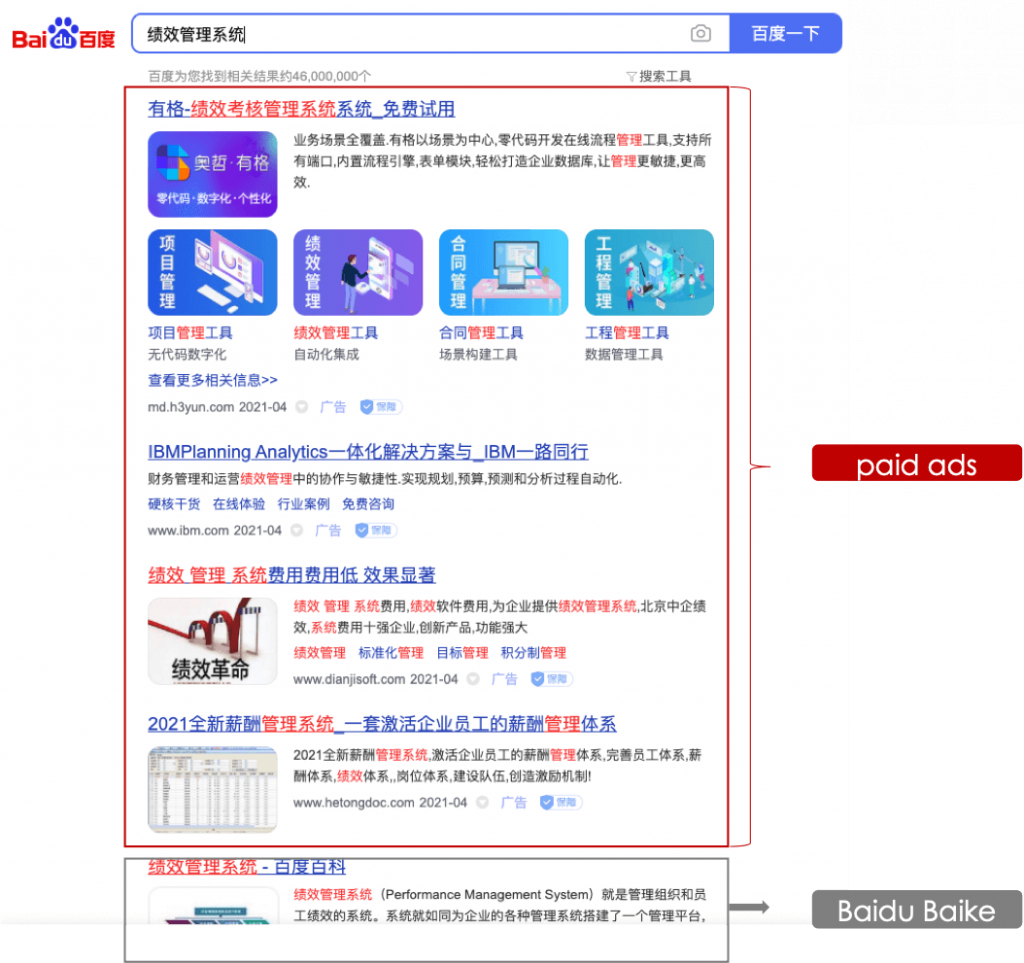
Step 3. Optimize content on social media
Another important fact that matters for the organic search result on Baidu is the social media optimization. For instance, Baidu partners with Sina Weibo, and allows indexing Weibo posts in Baidu’s results page. Therefore, to leverage other social platforms is crucial to increase website awareness is imperative.
3. B2B Platforms
B2B digital platforms are becoming more critical with racing digitalization for the companies. The revenue of the B2B e-commerce in China boomed 275% from 16 million RMB in 2012 to 60 million in 2018 (12th May, 2021, statista). B2B e-commerce in China has been dominated by several online platforms, here are three most important channels for B2B business in China.
#1 Alibaba.com
With 53 million users from over 150 countries, Alibaba.com is the leading platform of global wholesale and the world’s largest B2B marketplace based in China. The platform serves as an intermediary between traders and buyers.
There are 12 main product categories and each with plenty of subcategories. The website offers 15 different languages and transaction currencies from all over the world. Most of the suppliers on the site are from China but some are also international companies.
A variety of international payment options are available such as Visa, Mastercard, Boleto, Western Union and telegraphic transfers. Alibaba offers logistics services and trade insurance to ensure that buyers can get money back if there are any problems with the supplier.
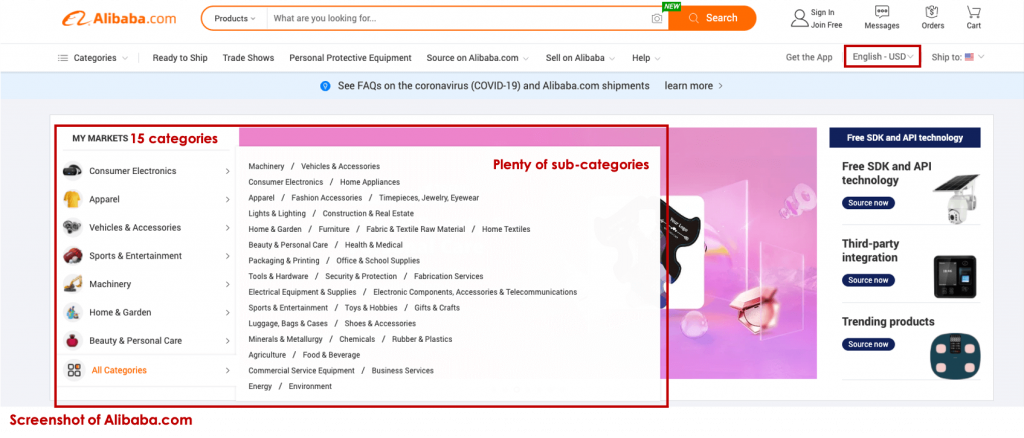
#2 1688.com
1688.com is Alibaba’s second B2B website and serves for domestic buyers, suppliers and manufacturers. As the market leader within China, it offers businesses the opportunity to open stores to sell products directly or advertise.
1688.com was built on Alibaba model but there is only Chinese interface. The site has integrated the live streaming function that companies can directly show the view from factories, warehouses and answer questions from buyers. All the live streaming sessions can be replayed on the site.
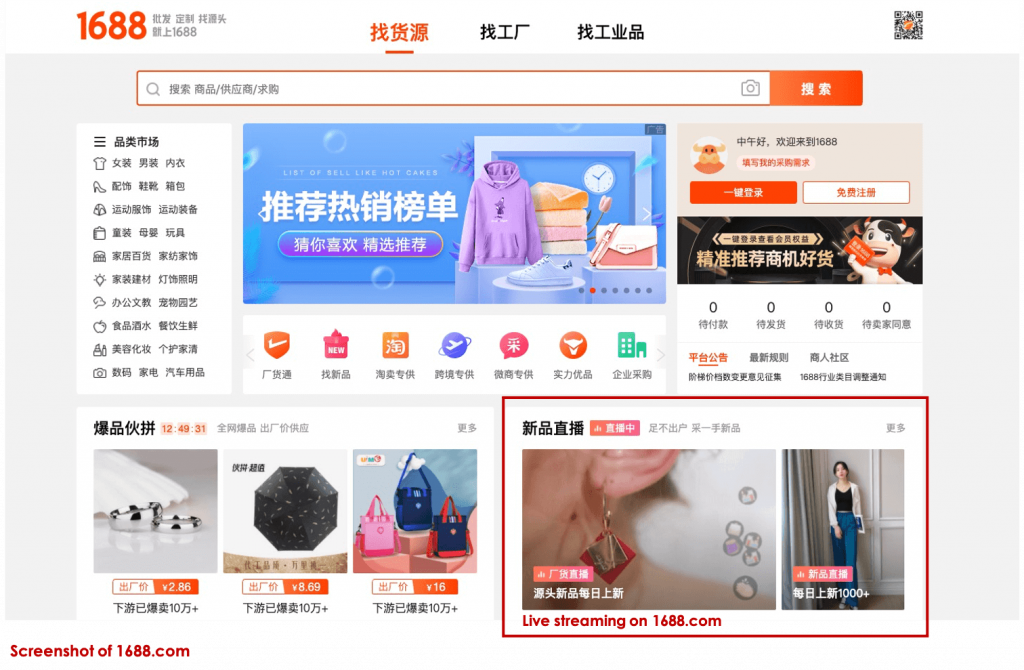
#3 Globalsources.com
Headquartered in Hong Kong, Global Sources is also one of the leading B2B marketplaces, enabling buyers from around the world to trade with verified suppliers from China and Asia.
Global Sources is the one-stop online B2B marketplace that provides a platform for both buyers and traders to drive profitable trade. The site is in English and it also sponsors trade shows in the region.
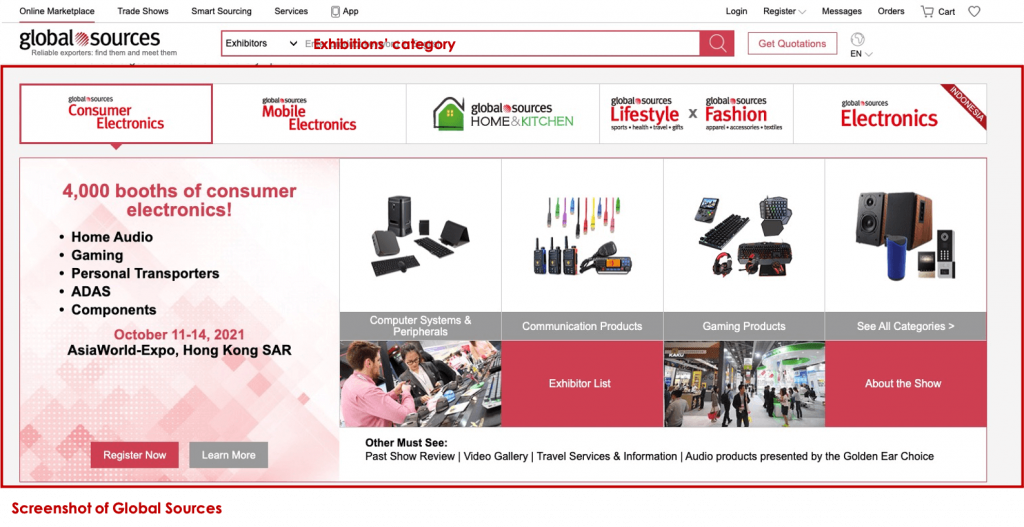
4. Use social media for B2B Marketing in China
Social media is vital for B2B companies to build connection with consumers. Chinese B2B buyers behave the same online and mobile experiences when they encounter as consumers. B2B businesses have to establish brand recognition in China and work on the following three main social platforms.
4.1 Zhihu – the Chinese equivalent of Quora
What is Zhihu?
- Zhihu (知乎), the Chinese Q&A website, with its motto ‘Share your knowledge, experiences, and thoughts with the world’ has been compared to Quora which shares the similar functions.
- As of 2020, 420 million registered users, 45 million daily active users (DAU) that spend an average of 70 mins/day on Zhihu. (Zhihu 2020 marketing & sales guidebook)
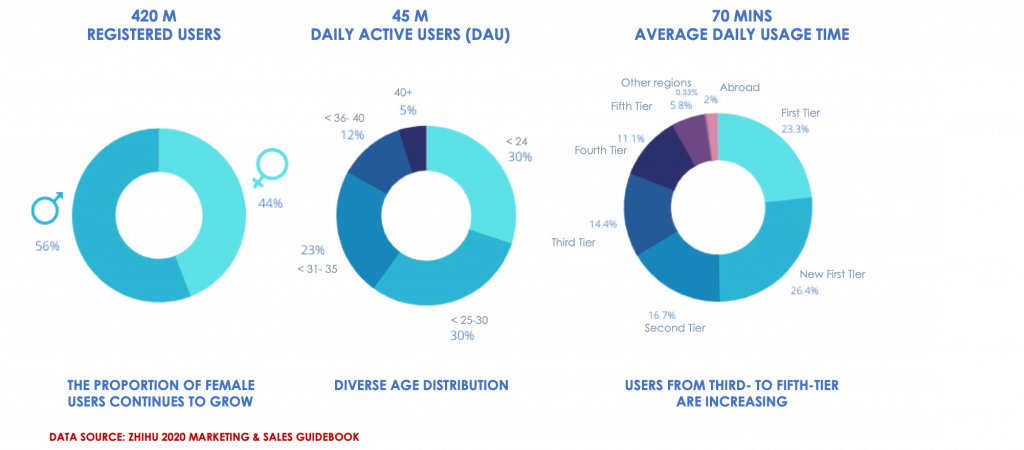
- Apart from the basic Q&A feature, Zhihu also offers users a platform that they can write articles, joining BBS discussion, browsing e-magazine, and presenting in a live-streaming show.
Why Zhihu?
- Zhihu’s user demography shows the high-profile feature to target B2B industry consumers:
48% coming from first-tier cities, with 98% of users above 18 years old.
80% hold bachelor’s degree or above
76% make more than 10,000 RMB per month (Source: iResearch, 2017)
- The high-profile user base on Zhihu help to create large amounts of industry-specific topics. B2B companies could expect high interaction for knowledge related topics.
- Zhihu has developed different content marketing features that are specific for B2B brands to convey the professional brand information. This helps B2B brands to attract potential partners, business clients and fellow professionals.
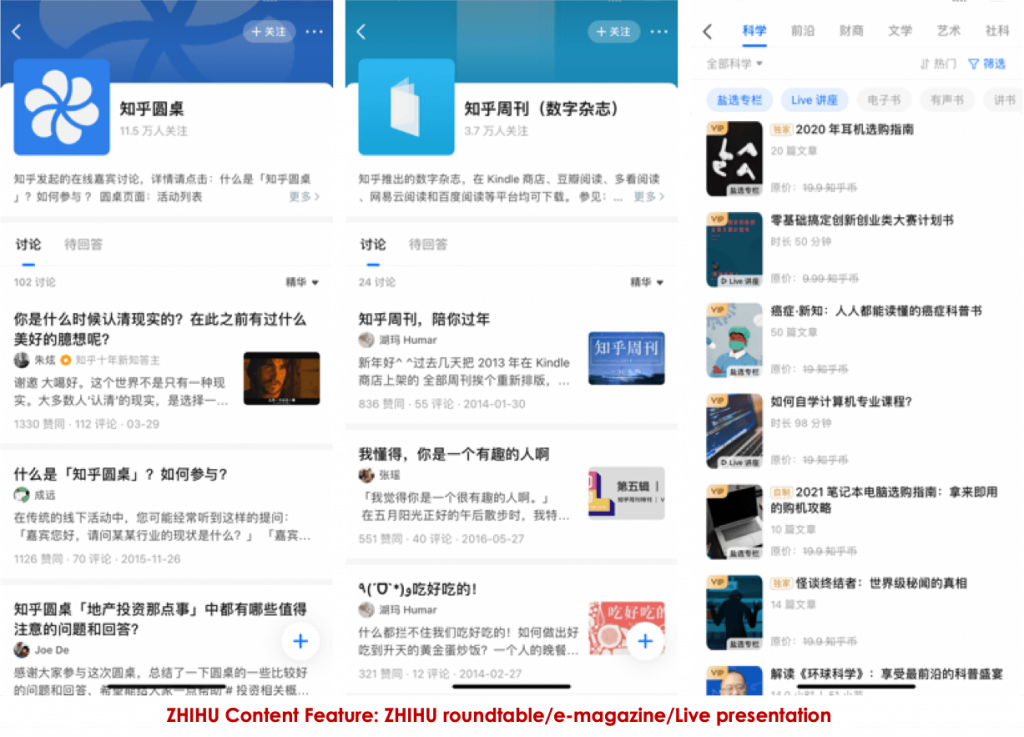
Zhihu Marketing Features
#1 To create high-quality brand content
Brand account on Zhihu can deliver insightful content and interactive with users by answering questions. Don’t release too promotional or pushy content that may not resonate with the users.
[Case Study]
TopBook brand content
TopBook, a Chinese based content producer with its vision to help people build an effective career life through the intelligent method.
Last year, TopBook contributed an article with the original video educating people how to leverage Cornell notes to promote efficiency of self-study. The brand content pop up in the results page when people search ‘Cornell note’. The brand article including the video has gained more than 10 thousand interaction (likes and comments).
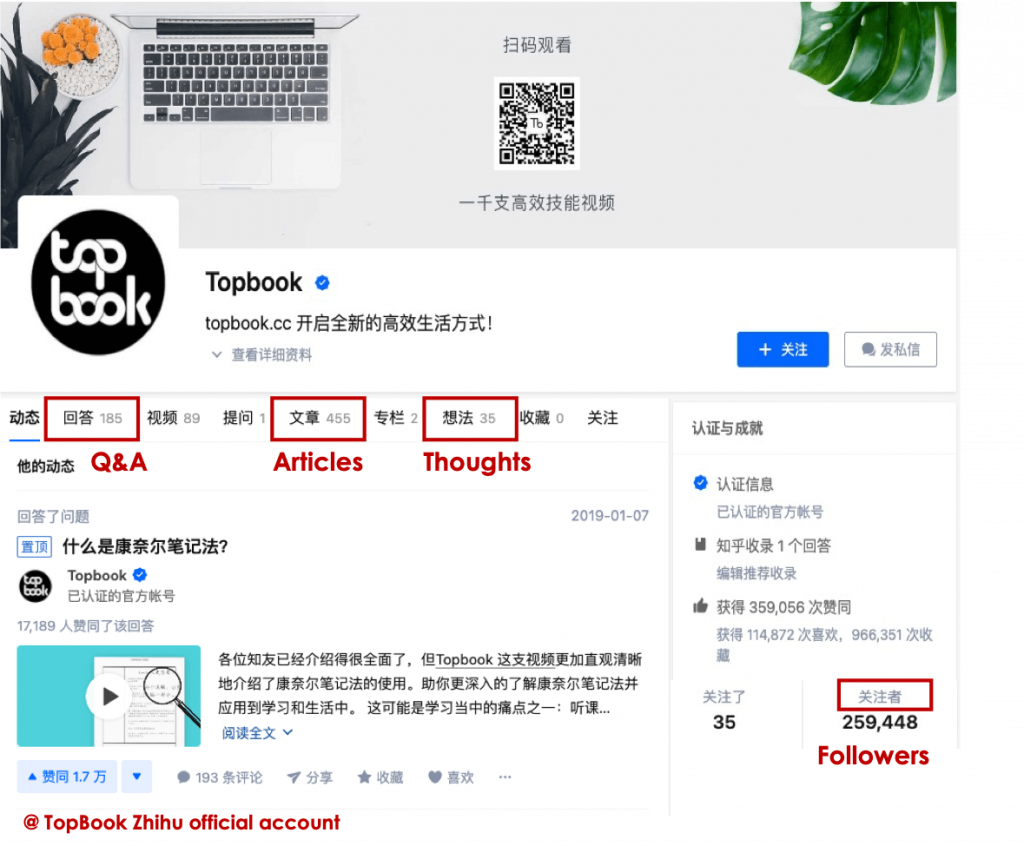
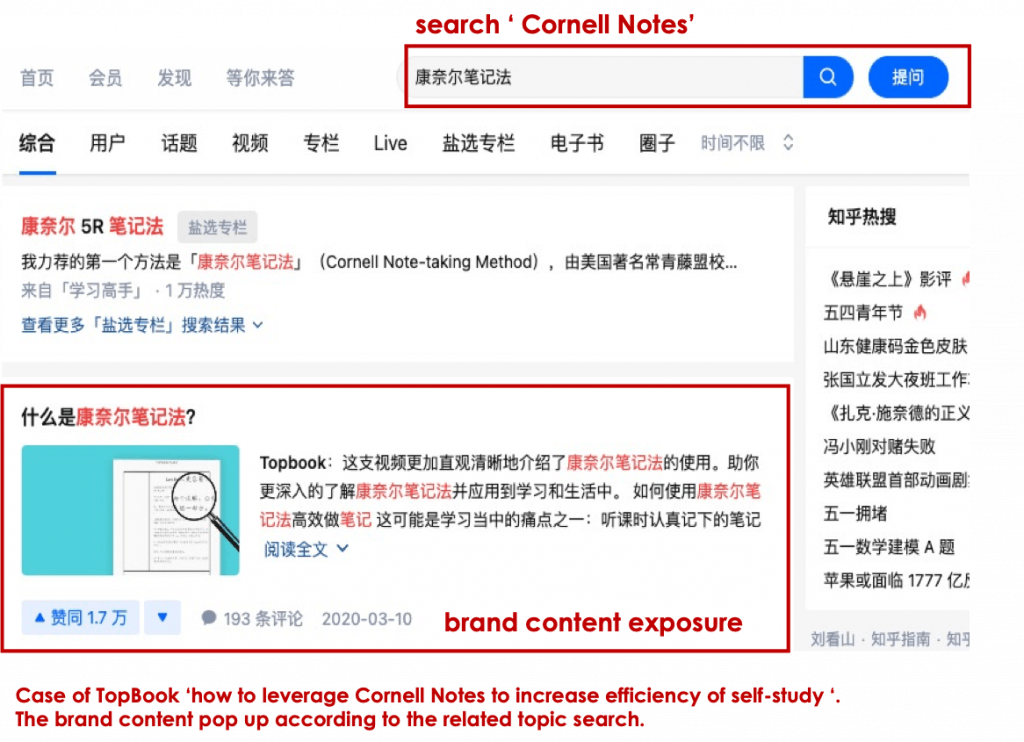
#2 Q&A campaign
Q&A campaign helps brand to convey the brand story or service introductions. Brand can grab the chance to showcase its expertise and connect with the industry experts and general users.
By constantly responding to relevant topics with high-quality answers, brand can build a good reputation on the site.
Here are some common questions to ask about products, services or brand history:
- How does it feel like to be a professional XXX?
- How to evaluate the product XXX?
- What do you think about the event XXX?
[Case Study]
Mercedes-Benz Q&A campaign
German automobile brand Mercedes-Benz is a showcase of how to generate good questions to boost its brand content on Zhihu. Mercedes-Benz raised the question of ‘What great explorations human beings made that has changed the history’? (人类做过的哪些伟大的探索,改变了历史进程) The answer got more than 1 million impression within half a day and accumulated more than one hundred qualified answers.
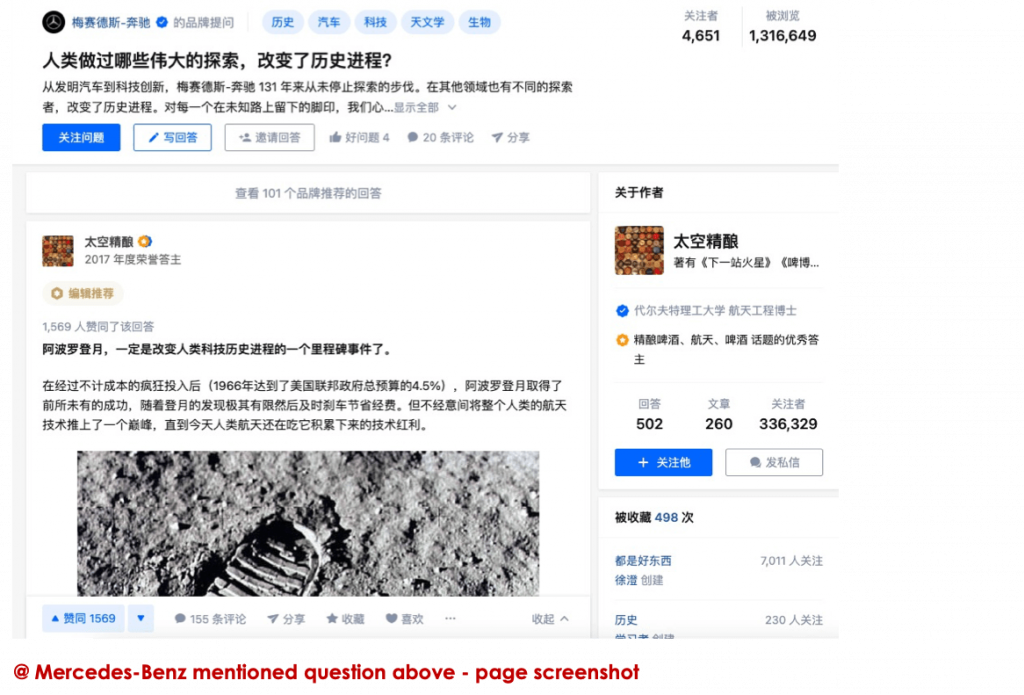
#3 Zhihu influencer campaign
There are a large number of qualified influencers cooperating with Zhihu. Brand can work with industry or topic-specific influencers to enlarge brand influence and desired audience.
[Case Study]
Insta360 social campaign
Insta360, a domestic brand serves as 360-degree cameras has recently integrated Zhihu tourism influencers into their digital marketing strategies. The campaign has generated high-qualified brand content and highly increased the awareness of the star product Go2.
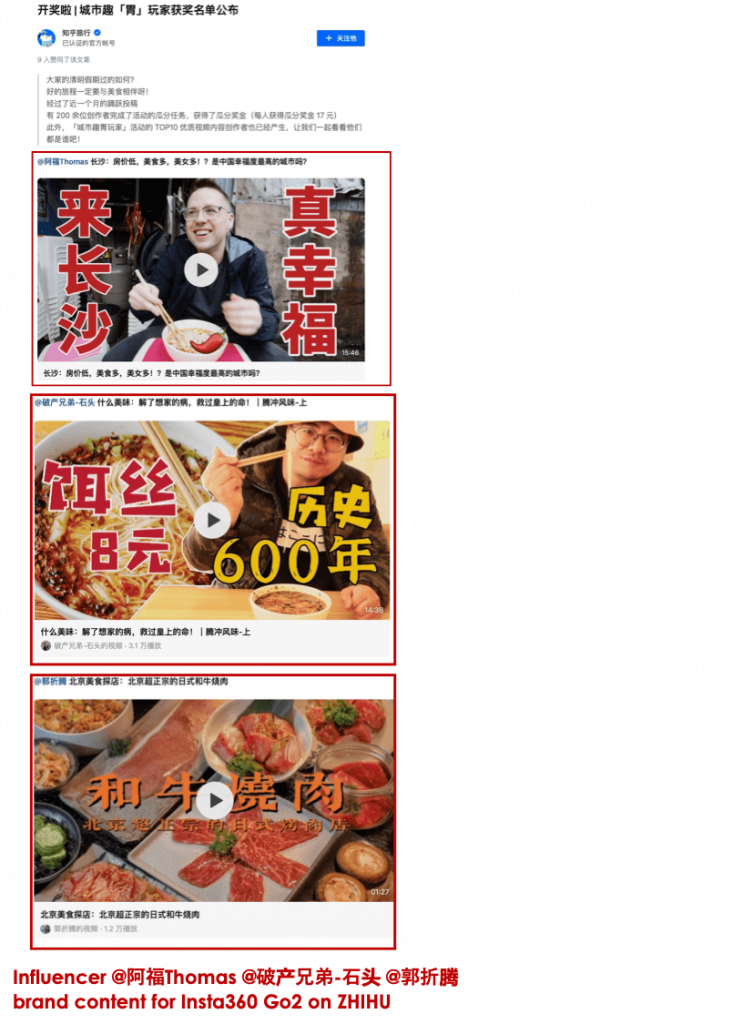
4.2 WeChat
While correspondence via emails is popular in western countries, seamless communication via the super app WeChat is preferred in China.
More than 90% of all WeChat users also use this app for work communication. QR codes allow access to company accounts through simple scanning, as Chinese business contacts like to get detailed information about companies, services and products, it is essential to think of using QR codes on all marketing platforms (website, ads, business cards) as well.
WeChat is clearly an indispensable tool for efficient and effective B2B marketing.
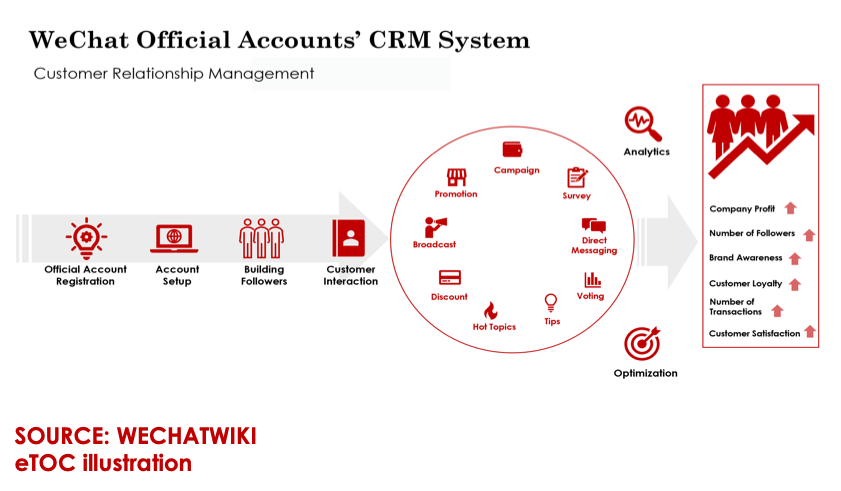
[Case Study]
BASF has utilized their WeChat account as the main tool to convey corporate social responsible in China. They created the topic page #BASF sustainability and collected all original articles under the page. New users can easily read them when they follow the account.
BASF also leverage with the WeChat navigation menu bar to segmentize different business units. That helps to provide the potential new customers with clear business services.
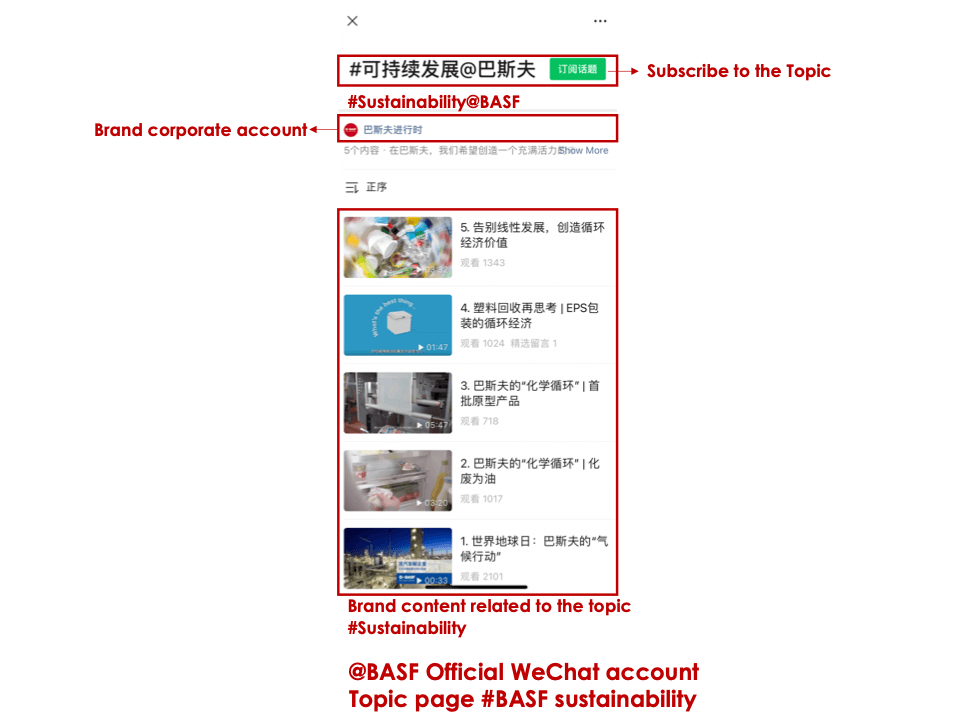
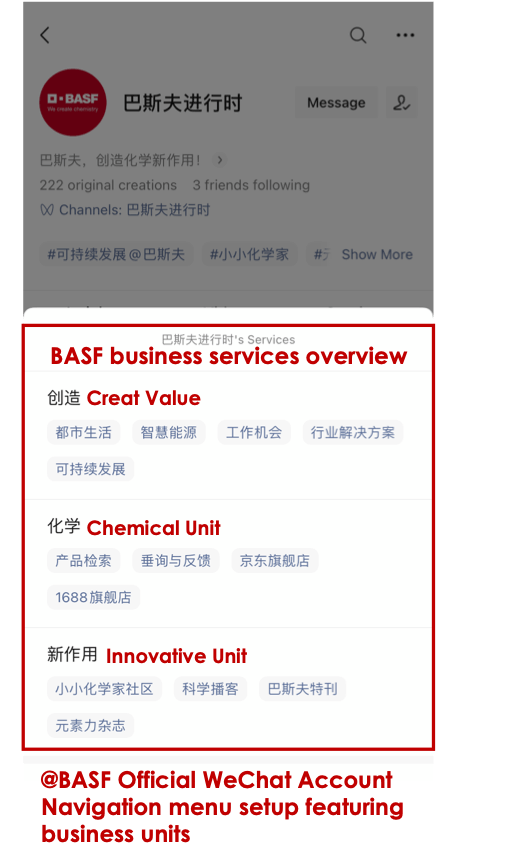
4.3 Weibo
Weibo is the microblogging platform in China and can be considered a combination of Facebook and Twitter. With around 523 million monthly active users (Statista: Q3 2020), Weibo is an open public social network and the most popular platform for KOL marketing and essential for a company’s image cultivation.
It is important to post brand content regularly, engage and interactive with consumers. Nicely designed visual image or videos are recommended which will generate more engagement.
[Case Study]
Siemens Official Weibo Account
Since Siemens Group has many subsidiaries in China, they have different accounts on Weibo such as Siemens Industry, Siemens Industrial Digitalization, Siemens Home Appliances and the others.
In order to stand out the main account ‘Siemens Group corporate’, they mainly utilize the compelling visual to convey core business between China and Germany.
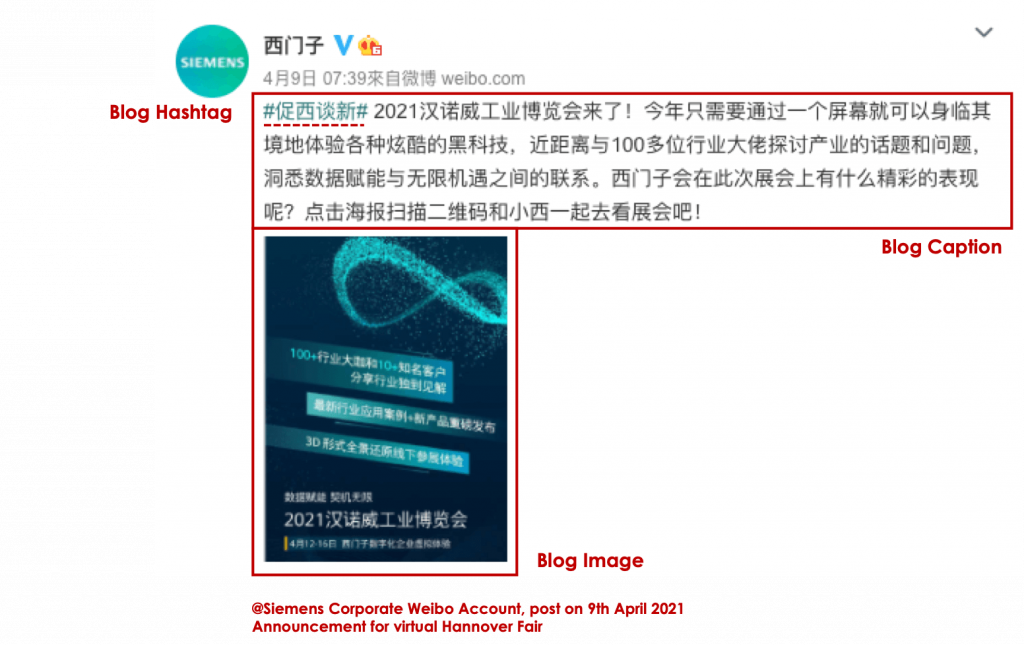
B2B companies can also collaborate with the other companies on Weibo. This can help the business to expand reach of similar target audiences.
[Case Study]
IBM posted together with Delta Air Lines to highlight their partnership in 2021. Both business accounts are able to reach more potential new users from each other’s Weibo followers.
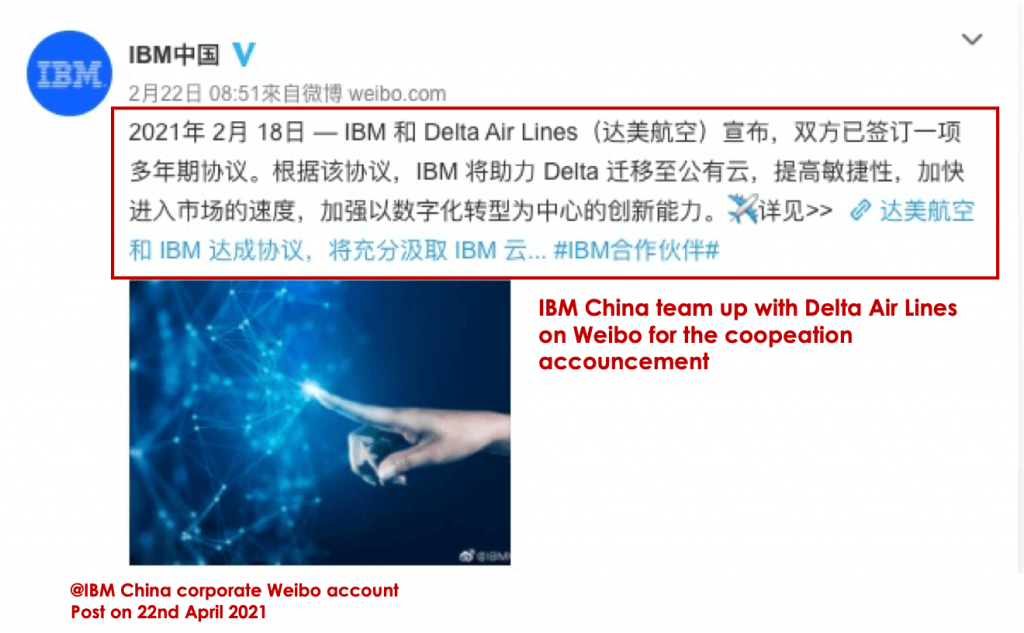
Key Takeaways
A successful B2B marketing in China must cover the following aspects:
- Attend Important Trade Fairs, Conferences and Industry Events in China
- Make a localized website fit for China
- Use search engine optimization to reach potential leads
- Establish your brand on most relevant key Chinese B2B platforms
- Make use of key social media platform like WeChat and Weibo.
Contact us for more B2B customized digital marketing strategy for your business.
Want to have a first free consultation session about B2B marketing in China? Contact us.
